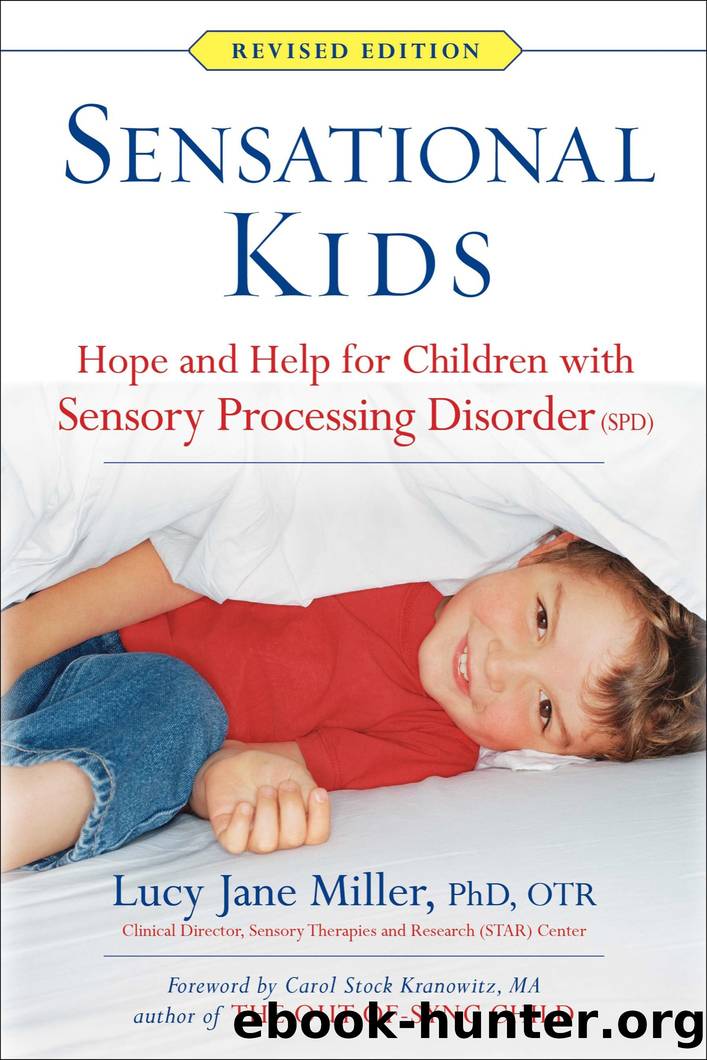Sensational Kids by Lucy Jane Miller

Author:Lucy Jane Miller
Language: eng
Format: epub
Publisher: Penguin Publishing Group
Published: 2007-01-02T00:00:00+00:00
The Role of the Vestibular System
Benâs spinning in the corner after his tantrum illustrates his quest for stimulation in another system often implicated in sensory processing disorder: the vestibular system.
The vestibular system is made up of several structures in the inner ear. When the head tilts in any direction, fluid moves small hairs within the structures and their movement lets us know our position in relation to the earthâs gravity. This is how we know when we are falling to one side.
Humans need vestibular stimulation and use it for both calming and arousing. If youâve ever relaxed by moving back and forth in a glider or a porch swing, you know what it feels like to calm yourself with this system. It is the same effect that Ben is after when he rocks in the corner. Likewise, if youâve ever found yourself itching to get up and move around during a long meeting or on an airplane flight, you know how it feels to hunger for the arousing effects of vestibular stimulation. (You are probably also seeking proprioceptive input to your muscles and joints.) This is what Ben is craving when he begins to spin.*
Children generally need and want more vestibular stimulation than adults do, which explains why many babies and toddlers thrill at being lifted or even tossed in the air and why spinning and whirling toys and rides are so popular with kids. The difference between a sensory-craving child like Ben and typically developing children like Ryan is that Ben craves more of this type of stimulation. Inside, he constantly feels the way you or I would on a cross-country flight during which the Fasten Seat Belt sign never goes off.
Among the proposed explanations for this pattern is that the threshold for detecting movement is higher in sensory cravers, requiring movement that is stronger, lasts longer, or occurs more frequently to trigger their sense of movement. Whatever research eventually finds, there is little question that children like Ben respond well and function more successfully when they are given activities that calm their sensory cravings.
* Note that this spinning is not the repetitive behavior pattern observed in autism and some other conditions. It is a series of novel movements that are sought out to quell the feelings inside that are begging for input. The difference is that children with autism spectrum disorder seek out the same exact movement pattern over and over repetitively but children with SPD seek out different patterns to assuage their thirst for movement stimulation.
Some researchers believe the behavior of children who are sensory craving stems from sensory under-responsivity such as we saw in Tam. Although this subject has not been well researched, my view is that the same underlying neurological mechanism is unlikely to produce such dramatically different behaviors and that with time and study we will find two different brain mechanisms are at play.
Download
This site does not store any files on its server. We only index and link to content provided by other sites. Please contact the content providers to delete copyright contents if any and email us, we'll remove relevant links or contents immediately.
Machine Learning at Scale with H2O by Gregory Keys | David Whiting(4313)
Never by Ken Follett(3957)
Fairy Tale by Stephen King(3399)
Will by Will Smith(2920)
Fantastic Beasts and Where to Find Them: The Original Screenplay by J. K. Rowling(2518)
It Starts With Us (It Ends with Us #2) by Colleen Hoover(2367)
Can't Hurt Me: Master Your Mind and Defy the Odds - Clean Edition by David Goggins(2342)
The Storyteller by Dave Grohl(2236)
Friends, Lovers, and the Big Terrible Thing by Matthew Perry(2230)
The Becoming by Nora Roberts(2203)
Cloud Cuckoo Land by Anthony Doerr(2114)
New Morning Mercies: A Daily Gospel Devotional by Paul David Tripp(1920)
A Short History of War by Jeremy Black(1848)
HBR's 10 Must Reads 2022 by Harvard Business Review(1845)
The Complete Witcher by Andrzej Sapkowski(1842)
Cytonic by Brandon Sanderson(1836)
Go Tell the Bees That I Am Gone by Diana Gabaldon(1758)
Leviathan Falls (The Expanse Book 9) by James S. A. Corey(1746)
A Game of Thrones (The Illustrated Edition) by George R. R. Martin(1746)
